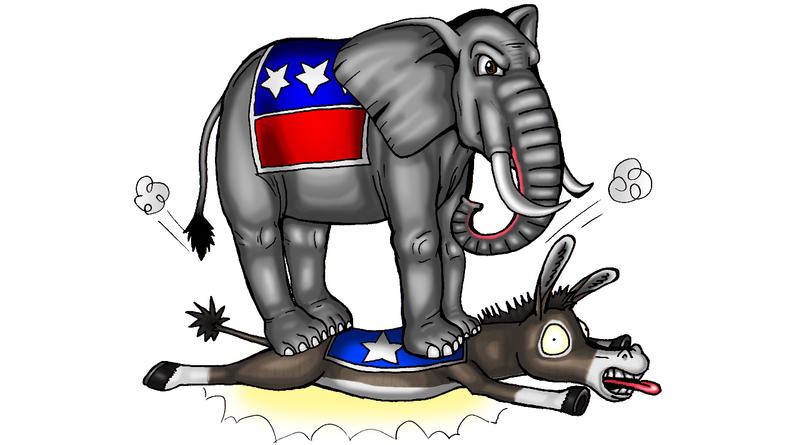Saying that the Democrats are in bad shape is a massive understatement. Here is the rundown of the state of the Democratic Party: Democrats have lost 69 out of 99 state legislatures, hold the minority of state governorships, lost the U.S. Senate, lost the U.S. House of Representatives and have total control of only 6 out of 50 states.
Worst of all, presidential nominee Hillary Clinton lost to Donald Trump, who was ranked the least popular political figure in the U.S. prior to election day. According to The Washington Times, Trump had a 61 percent unfavorability rating in November, yet Clinton was still unable to defeat him. One would think that the 2016 election would be a wake-up call to Democrats to stop taking corporate money and address the policy concerns of the working class. Sadly, that is not the case.
Immediately after the election, the Democrats maintained the status quo by selecting U.S. Senator Chuck Schumer and U.S. Representative Nancy Pelosi as leaders in the Senate and House respectively. These two have proven to be the least capable of leading congressional Democrats.
Schumer ironically predicted the following with regard to Clinton’s right-wing pivot in the general election: “For every blue-collar Democrat we lose in western Pennsylvania, we will pick up two moderate Republicans in the suburbs in Philadelphia, and you can repeat that in Ohio and Illinois and Wisconsin.”
Additionally, under the leadership of House Minority Leader Pelosi, Democratic membership in the House has dropped by 19.3 percent according to the Washington Post.
Still, high ranking Democrats continuously deny any need for strategic or policy change in spite of contrary public polling.
“Don’t assume that the answer to big crowds [of anti-Trump protesters] is moving policy to the left,” former Clinton staffer Jennifer Palmieri argued on Meet The Press. Palmieri’s assessment is woefully inaccurate. She cites raising the minimum wage as an example, saying that people are not asking for change on that issue. However, 53 percent Americans believe a minimum wage increase would help workers according to a 2016 HuffPost and YouGov poll.
Salon reports that other liberal policies, such as universal healthcare and increased taxes on the wealthy, are supported by 58 percent and 61 percent of Americans respectively.
“I don’t think people want a new direction,” said Pelosi on CBS’s Face the Nation in December 2016. Current polling of the Democrats refutes Pelosi’s claim. Thirty-six percent of registered voters view Democrats favorably, compared to 52 percent who view Democrats unfavorably, according to a USA Today and Suffolk University poll released March 7.
Members of the Democratic Party have refused to take responsibility for Clinton’s loss in the 2016 general election. Many have shifted the blame onto FBI Director James Comey, Russian hacking of the DNC, and U.S. Senator Bernie Sanders. However, evidence suggests that the Democrats’ losses were due to a lack of connection to progressives and the working class.
Wesleyan Media Project published a report on March 6 showing Clinton’s ineffective messaging during the election. The report shows that only 25 percent of Clinton’s TV ads focused on policy substance. Vox Media adds that Clinton spent next to nothing on advertising in Wisconsin, Michigan, and Pennsylvania until the week leading up to the election.
The Democrats were given an opportunity to change during the race for the Democratic National Committee Chairman position. U.S. Representative Keith Ellison ran for the chairman position and would have signaled a change in the Democratic Party.
Ellison endorsed Sanders in the presidential primaries and garnered support from Sanders, Schumer, and former Senate Minority Leader Harry Reid. Ellison’s election to the DNC Chair would have consolidated the progressive and establishment factions of the party.
Ellison also promised to clean up the secretive, elitist image of the DNC. In an interview with the Huffington Post, Ellison said that the DNC should stop accepting lobbyist money to reestablish trust and transparency with Democratic constituents, saying “I think that it is important that the people feel that the party is their party.”
However, the majority of DNC members chose former Secretary of Labor Thomas Perez, who supported the Trans-Pacific Partnership, did not promise to end lobbyist funding, and admitted in an email that he wanted to “put a fork” in Sanders’ support from Latinos during the primaries. Electing Perez showed that the Democratic establishment does not want to compromise with the progressive wing in any way. To add insult to injury, DNC members voted Feb. 25 to keep lobbyist money while they voted in Perez.
When Anderson Cooper asked on March 21 who the leader of the Democratic Party is, Pelosi struggled to answer and mentioned Clinton as a potential standard bearer, saying “Hillary Clinton did not win the election, but [she is] a respected leader.”
Pelosi stated this in spite of how Clinton’s favorability has declined since the election. According to the USA Today and Suffolk University poll, Clinton has a 35 percent favorability rating compared to 55 percent unfavorable. Clinton’s ratings are worse than President Trump’s, who is polling at 45 percent favorable and 47 percent unfavorable. Clinton has replaced Trump as the least popular politician in the country.
The poll also shows that Sanders, who had very little support from the Democratic establishment and received far fewer superdelegates at the Democratic National Convention, is the most popular politician in the country. Sanders has a 61 percent favorability rating and a 28 percent net favorability overall.
In spite of that, many elected Democrats have tried to distance themselves from Sanders, often citing how he is an Independent and thus should not have a say in the party’s policies.
Texas DNC member Gilberto Hinojosa said, “It is very concerning that Bernie Sanders is so intent on taking over a party that he is not even a member of that he’d insult the vice president—and really the president—about a failed status quo approach,” according to The Hill.
The true problem with the Democrats is that they lack a clear vision for the American people. Unlike the Republicans after 2012, Democrats have yet to reflect on why they have lost the nation’s support and instead shield themselves from any criticism. Their resistance to progressive change will be their downfall in 2018. But as Sanders eloquently said in a March interview with the New York Times, “They would rather go down with the Titanic so long as they have first-class seats.”









